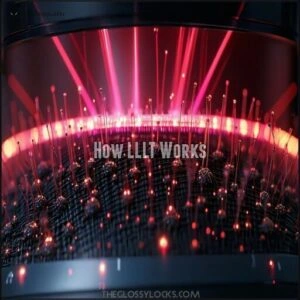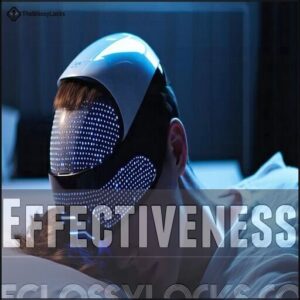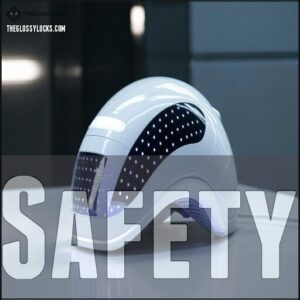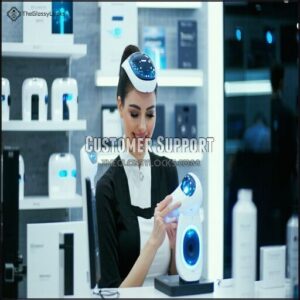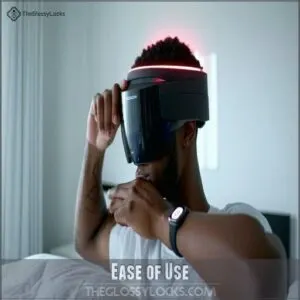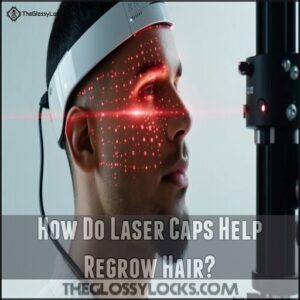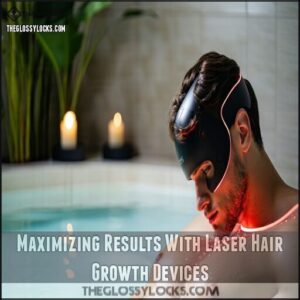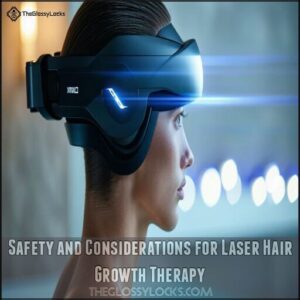This site is supported by our readers. We may earn a commission, at no cost to you, if you purchase through links.
 Finding the best laser cap for hair loss comes down to your needs, budget, and comfort.
Finding the best laser cap for hair loss comes down to your needs, budget, and comfort.
The Kiierr 272 Premier is a top pick for most people, offering effective Low-Level Laser Therapy (LLLT) at an affordable price.
If you’re looking for premium features and faster treatment times, the Capillus PRO stands out, though it’s a pricier option.
For comfort and portability, the Hairmax PowerFlex 272 is a great choice with a flexible design.
LLLT is FDA-cleared and safe, promoting hair growth by stimulating follicles.
Choosing the right cap could make a world of difference—just be sure it fits your lifestyle.
Table Of Contents
- Key Takeaways
- How Does LLLT Fight Hair Loss?
- Choosing The Right Laser Cap for You
- Top 3 Best Laser Caps for Hair Loss
- How Do Laser Caps Help Regrow Hair?
- Are There Any Side Effects From Using Laser Caps?
- Maximizing Results With Laser Hair Growth Devices
- Long-Term Maintenance for Continued Hair Growth
- Safety and Considerations for Laser Hair Growth Therapy
- Frequently Asked Questions (FAQs)
- How long does laser hair growth treatment last?
- Is laser hair growth permanent?
- Do laser combs work for hair growth?
- What is the best laser cap for hair loss?
- Do laser caps really regrow hair?
- Which is better, Capillus vs. iRestore?
- What laser caps are FDA approved?
- Which laser hair regrowth cap is best?
- Which is better, Capillus vs. iRESTORE?
- Do laser hair caps really work?
- Conclusion
Key Takeaways
- You’ll get the best results with laser caps like Kiierr 272 Premier or Capillus PRO, which offer full scalp coverage and FDA clearance for effective hair regrowth.
- Consistent use, around 3-4 times a week, is crucial for results, with visible improvements typically starting around the 4-6 month mark.
- Safety features, like eye protection and FDA certification, ensure you’re using a risk-free device while promoting hair growth.
- Choosing the right device depends on your budget, lifestyle, and goals—Capillus PRO is perfect for quick treatments, while iRestore offers affordability without compromising results.
How Does LLLT Fight Hair Loss?
Low-level laser therapy (LLLT) uses specific wavelengths of light to stimulate your scalp and improve hair growth.
Low-level laser therapy awakens dormant follicles and boosts scalp circulation, sparking hair growth and restoring thickness naturally.
By increasing blood flow and cellular activity, it helps reawaken dormant follicles and reduce hair loss, which can be achieved through low-level laser therapy.
What is Low-Level Laser Therapy?
Low-Level Laser Therapy (LLLT) is like a switch that turns your hair follicles back on—scientifically proven and FDA-cleared.
This cutting-edge treatment, rooted in photobiomodulation, uses low-level light to stimulate hair growth without pain or invasive methods.
Here’s what happens during LLLT sessions:
- Revitalizes Follicles: It stimulates dormant hair follicles, helping them enter the active (anagen) phase.
- Boosts Circulation: The lasers improve blood flow, flooding your scalp with oxygen and nutrients.
LLLT devices, like laser caps, emit safe light wavelengths—typically 630-660 nm—to energize follicles at the cellular level.
This sparks ATP production (think of it as cellular fuel), promoting new growth and thicker, stronger strands.
Clinical evidence backs up its effectiveness when used consistently.
For anyone battling hair loss, LLLT offers hope and results, acting as a game-changer in the fight against thinning hair.
Is LLLT Safe?
In the context of LLLT safety, you’re protected by rigorous device standards.
FDA-cleared laser caps use safe wavelengths, avoiding harmful effects while promoting hair growth. Side effects? They’re rare—mild redness or scalp sensitivity early on.
Long-term effects don’t include cancer risk or skin damage, as research confirms these devices are safe for regular use. However, using uncertified caps may pose home use dangers, like improper light intensity or absent safety features.
Always check for eye safety sensors to protect against potential retinal damage. LLLT’s effectiveness stems from photon absorption stimulation.
Here’s a snapshot of LLLT safety:
| Factor | Risk Level | Prevention |
|---|---|---|
| Skin Cancer Risk | Low | FDA-cleared devices minimize risks. |
| Retinal Damage | Low | Use caps with automatic safety sensors. |
| Side Effects | Rare | Typically mild redness; follow guidelines. |
| Device Certification | Essential | Always choose FDA-cleared laser caps for proven safety. |
How LLLT Works
Think of your hair as a garden, and LLLT (low-level laser therapy) as the sunlight activating growth.
By energizing your scalp with specific light wavelengths, this groundbreaking method revives dormant follicles and restores the hair growth cycle.
Energize your scalp, awaken dormant follicles, and restore growth with the power of low-level laser therapy (LLLT).
Here’s the LLLT mechanism of action:
- ATP Production: Boosts follicle cells’ energy, enabling stronger, healthier hair.
- Blood Flow: Improves scalp circulation, delivering essential oxygen and nutrients.
- Photobiomodulation: Stimulates follicle activity and rejuvenation for regrowth.
- Inflammation Reduction: Creates a healthier scalp environment, essential for hair recovery.
This non-invasive therapy wakes up tired follicles, increasing cellular activity.
With consistent use, it supports a fuller, healthier scalp, proving how LLLT and hair growth cycles go hand in hand.
Choosing The Right Laser Cap for You
Selecting the right laser cap can feel overwhelming, but focusing on key factors like effectiveness, safety, and cost makes it manageable.
Understanding your needs and the device’s features guarantees you invest in a solution that supports your hair growth goals.
Effectiveness
To make the most of a laser cap hair solution, understanding its effectiveness is key.
Hair regrowth caps work best when backed by FDA clearance and clinical evidence, giving you confidence in their results for long-term success. They may not be instant miracles, but for many, they’re a reliable hair loss treatment.
Here’s what boosts their effectiveness:
- Treatment Duration: Consistency is everything. Most users see noticeable hair regrowth rates after 4-6 months, with peak results around 12 months.
- Diode Count and Coverage: Caps with 200+ medical-grade diodes guarantee better scalp coverage, improving your chances for thicker, fuller hair.
- Starting Early: The earlier you begin laser hair growth treatments after noticing thinning, the better your results might be.
Patience, perseverance, and proven science deliver real user satisfaction. To maximize results, research laser cap options thoroughly.
Safety
When picking a laser cap for hair loss treatment, safety should be just as important as performance. You want something that works without risking your well-being.
Thankfully, FDA-cleared laser therapy hair devices meet strict safety standards, offering vital protections.
| Safety Feature | Why It Matters |
|---|---|
| Eye protection | Shields your eyes from accidental diode exposure. |
| Diode safety | Medical-grade lasers avoid harmful radiation. |
| Skin sensitivity | Guarantees compatibility for different skin tones. |
| EMF exposure | Devices are engineered to minimize EMF levels. |
| Overuse risks | Auto-shutoff prevents overtreatment. |
Low-level laser caps, like the Hairmax PowerFlex and iRestore Essential, are gentle and free of harmful UV rays. However, avoid them if you’re taking photosensitive meds or have skin conditions, including melanoma.
Always confirm a cap’s safety certifications before use. Small safeguards, like built-in sensors or auto-shutoff, go a long way in making laser cap hair treatments both effective and worry-free. Protect yourself first!
Cost
Now that you understand the importance of safety, let’s take a closer look at the cost of finding the best hair cap. Laser hair growth products range from $200 to $3,000, with the sweet spot falling between $500 and $1,000 for quality results at a reasonable price.
Balancing cost versus results is key. High-end models like the iRestore Essential ($695) offer clinical results without breaking the bank. The Kiierr148 Pro ($645) is a budget-friendly option with reliable performance. For tighter budgets, Illumiflow provides flexible financing, making hair restoration more accessible.
When evaluating cost, offset your expenses with potential offers like markdowns, rebates, or bundle discounts. Many consumers search for information about laser cap prices before making a purchase.
- Cap Affordability: Look for devices with high diode counts at lower prices.
- Value Proposition: Prioritize money-back guarantees and warranties.
- Long-term Expenses: Compare repair costs and maintenance plans.
Customer Support
Choosing the best laser cap isn’t just about features—it’s about the confidence good customer support brings.
From quick warranty claims to a smooth return process, support channels can make all the difference. Look for brands with satisfaction guarantees and high LLLT customer reviews for peace of mind.
| Feature | What to Expect | Why It’s Key |
|---|---|---|
| Support Channels | Multiple options | Easy, accessible help |
| Response Time | Within 24 hours | Fast troubleshooting |
| Warranty Claims | 1-3 years of coverage | Protects your investment |
| Return Process | 6-12 months risk-free | Confidence in trying it |
| User Reviews | 4+ star averages | Real-world reliability |
Strong hair growth customer service guarantees solutions when you need them most.
Ease of Use
Great hair loss treatments shouldn’t feel like a chore.
The right laser cap should fit seamlessly into your daily life with features that prioritize ease and efficiency.
Here’s what to look for:
- Session Time – Choose caps with treatments under 30 minutes, so they don’t dominate your day.
- Control Simplicity – A single button is your best friend—no complicated controls or programming.
- Cap Design & Comfort – Adjustable, lightweight caps guarantee a snug fit that stays put, even if you’re moving.
- Portability & Battery Life – Rechargeable batteries lasting multiple sessions keep treatments hassle-free, whether at home or on the go.
Top 3 Best Laser Caps for Hair Loss
Choosing the best laser cap can feel overwhelming, but a focused comparison simplifies the process.
Here, you’ll find the top three options that combine proven effectiveness, safety, and convenience for addressing hair loss.
1. Hairmax PowerFlex Laser Cap for Hair Growth
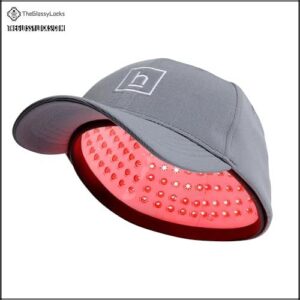
The Hairmax PowerFlex 272 Laser Cap stands out for its advanced technology and convenience.
With 272 medical-grade lasers, it guarantees full scalp coverage and uniform light delivery, promoting hair regrowth effectively.
Clinically proven to revitalize hair follicles, it delivers visible results in just 7-minute sessions, three times weekly.
Its hands-free, mobile design makes it perfect for home use, while FDA clearance and a 93% success rate add to its appeal.
Hairmax also provides a 6-month money-back guarantee and 1-year warranty for peace of mind.
Best For: Individuals experiencing hair thinning or hair loss due to Androgenetic alopecia, menopause, or age-related factors, seeking an FDA-cleared, doctor-recommended, and convenient at-home solution.
- 272 medical-grade lasers for full scalp coverage and uniform light delivery.
- Proven results in just 7-minute sessions, 3 times weekly.
- 6-month money-back guarantee and 1-year warranty.
- 10% restocking fee for returns within 6 months.
- Requires consistent use over 3-6 months for visible results.
- Higher price point compared to similar devices.
2. iRestore Essential Laser Hair Regrowth
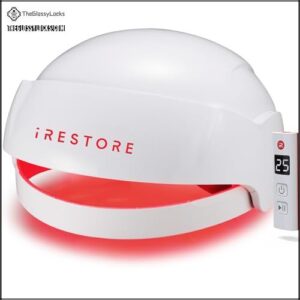
With the iRestore Essential Laser Hair Regrowth system, fighting hair loss becomes hassle-free.
This FDA-cleared device uses 120 medical-grade diodes, blending lasers and LEDs to target thinning hair, widening parts, and bald spots.
It’s lightweight, easy to use, and offers visible results in just 3-6 months, making it ideal for both men and women.
Backed by a 6-month money-back guarantee, it’s an affordable choice at $699, allowing users to achieve fuller, thicker hair by combining it with minoxidil or a healthy hair care routine.
Best For: Individuals experiencing early to moderate hair loss (thinning, widening parts, bald spots) who want a non-invasive, at-home solution.
- FDA-cleared device with clinically proven results for visible hair growth.
- Lightweight, hands-free design allows for easy daily use.
- 6-month money-back guarantee with expected results in 3-6 months.
- Not effective for completely bald individuals or advanced hair loss.
- Requires consistent long-term use for optimal results.
- 10% restocking fee applies if returned within the guarantee period.
3. Theradome Pro Laser Hair Growth Helmet
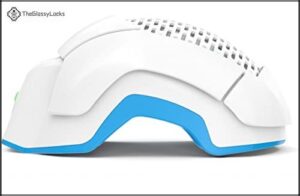
The Theradome Pro Laser Hair Growth Helmet is a trusted solution for fighting hair loss.
Using 80 advanced lasers, it targets your scalp with precision, promoting hair regrowth and thickness.
FDA-cleared and recommended by experts, its safety and effectiveness are backed by clinical trials.
With just two 20-minute sessions each week, it’s convenient to fit into your routine.
This treatment increases blood flow effectively, energizing weak hair follicles.
The helmet’s hands-free design and rechargeable battery make it easy to use anywhere, giving you reliable results without disrupting your day.
Best For: Individuals experiencing hair thinning or loss who want a safe, convenient, and scientifically-backed at-home treatment.
- FDA-cleared and clinically proven for safety and effectiveness.
- Hands-free, wireless design with a rechargeable battery for convenience.
- Delivers visible results in 3-6 months with just 20-minute sessions twice a week.
- High upfront cost at $995.00 may not suit all budgets.
- Requires consistent use over months for noticeable results.
- Not effective for complete baldness or fully inactive hair follicles.
How Do Laser Caps Help Regrow Hair?
Laser caps use low-level laser therapy (LLLT) to stimulate hair follicles, promoting thicker, healthier hair growth.
By increasing blood flow and cellular activity in the scalp, they aim to reawaken dormant follicles and combat hair loss effectively, utilizing this technology to achieve thicker, healthier hair growth.
What is The Best Wavelength for Hair Growth?
When uncovering how laser caps work, the secret lies in their precise wavelengths.
The best wavelengths for hair growth rely on years of clinical evidence showing how certain red light and near-infrared frequencies stimulate follicles:
- 650-655nm: Scientifically proven to maximize ATP production and energize hair follicles.
- 630-670nm: Penetration depth ideal for follicle activation and scalp health.
- 780-810nm: Near-infrared light reaching deeper dermal papilla for advanced regrowth needs.
- Combined wavelengths: Devices blending these ranges achieve 40% better results in advanced LLLT treatments.
These ideal nanometers target hair regrowth by improving blood flow, boosting nutrients, and energizing dormant follicles using diode power technology.
Many users report improved hair thickness.
What to Expect From Laser Hair Growth Treatment
Expect a gradual shift with a laser hair growth device.
Early on, you might notice initial shedding—a sign dormant follicles are reawakening. Some experience mild redness/itchiness, but it subsides quickly.
Results demand patience: visible growth milestones emerge after consistent use, often around 12-16 weeks.
Paired with a healthy scalp routine, a hair regrowth cap delivers steady, noticeable improvements.
Are There Any Side Effects From Using Laser Caps?
Using a laser cap for hair loss is generally safe, with minimal side effects reported.
However, you might experience mild scalp redness or a warm sensation during use, which usually resolves quickly, but this is not a major concern as it is a minimal side effect.
Can Laser Caps Cause Cancer?
If you’re considering a laser cap for hair loss treatment, it’s natural to ask: can it cause cancer? Here’s what you need to know about LLLT carcinogenic potential. Research shows that low-level laser therapy (LLLT) is safe, with no proven link to cancer, thanks to its use of non-ionizing radiation.
Unlike harmful radiation types, this light doesn’t damage DNA or cause genetic mutations. It stimulates regrowth without triggering cellular damage, due to the use of Non-Ionizing Radiation.
- Non-Ionizing Radiation: It stimulates regrowth without triggering cellular damage.
- Rigorous FDA Clearance: These laser caps undergo strict safety testing to assess radiation exposure.
- Healing Wavelengths: Red light therapy works at wavelengths promoting repair, not harm.
However, if you’ve had skin cancer, consult a doctor first. For most users, laser caps offer a secure, effective way to regrow hair.
Many also include features like eye safety sensors to guarantee user safety during sessions.
Common Side Effects of Laser Hair Growth
How can you tell if laser hair growth is working? Well, a few side effects might show up first. You could feel mild scalp irritation, temporary redness, or slight itchiness as your scalp adjusts.
Don’t worry if you notice a bit of extra shedding—this often signals new growth cycles starting. Light sensitivity or uneven growth might also pop up but typically fade quickly.
| Side Effect | Cause | Duration |
|---|---|---|
| Temporary Shedding | Increased hair turnover | Few weeks |
| Redness Concerns | Blood flow increase | Short-term |
| Scalp Irritation | Scalp adjustment | Minimal time |
Rest assured, these side effects rarely disrupt results. They are usually a sign that the treatment is working, and the body is adjusting to the laser hair growth process, which may include some temporary discomfort.
Maximizing Results With Laser Hair Growth Devices
To get the best results from laser hair growth devices, you need consistent use and proper technique.
Following the recommended treatment schedule and understanding key precautions can substantially improve your outcomes.
Treatment Frequency and Duration
Consistency is key when using a laser cap for hair regrowth. Following proper LLLT treatment schedules guarantees the best results over time.
Here’s a quick breakdown of what you need to know about treatment time and frequency:
- Session Length: Aim for 15-30 minutes per session, depending on your device’s guidelines.
- Treatment Schedule: Most recommend use 3-4 times weekly during the initial phase.
- Consistent Application: Stick with every-other-day sessions for the first 4-6 months.
- Visible Results: Hair starts to improve after 4-6 months, but patience is essential.
- Long-Term Use: After the first year, reduce to 1-2 weekly sessions for maintenance.
By following this hair growth duration plan, you’ll see stronger, healthier results.
Tips for Maximizing Hair Growth
Your laser hair growth journey isn’t just about wearing a cap—it’s about commitment.
To maximize benefits from your hair regrowth cap, focus on building a scalp-friendly routine to complement the laser cap benefits. Healthy choices amplify hair follicle stimulation, leading to noticeable improvements.
- Dietary Changes: Fuel your hair with leafy greens, nuts, eggs, and lean proteins to strengthen follicles from within.
Consider supplementing with products designed for a specialized hair diet.
- Scalp Massage: Gently massage your scalp daily to boost blood flow and enhance your hair growth device’s effectiveness.
- Stress Reduction: Find ways to de-stress—meditation, yoga, or deep breathing—to prevent stress-related hair loss.
Stay hydrated and choose high-quality, compatible products to foster a holistic routine. With discipline, your hair growth device can transform your scalp health dramatically.
Precautions and Contraindications
Approach laser hair growth therapy wisely by understanding essential precautions. While LLLT is effective, it’s not without limits. Some may experience mild side effects like skin sensitivity or temporary shedding—normal during regrowth cycles.
If you’re pregnant, on medication that causes light sensitivity, or managing conditions like eczema, consult your doctor first. Always choose FDA-cleared devices with eye safety sensors to avoid retinal damage. Protect your skin, follow recommended usage, and avoid rushing results.
Long-term success stems from careful use and attention to medical conditions. Many users report improved hair thickness.
| Precaution | Why It Matters | What to Do |
|---|---|---|
| Skin Sensitivity | Minimized irritation | Use as directed for short durations. |
| Eye Protection | Prevent retinal damage | Wear included eye shields. |
| Pregnancy Concerns | Potential fetal sensitivity | Consult a doctor before starting LLLT. |
Long-Term Maintenance for Continued Hair Growth
Maintaining hair growth with laser caps requires consistent use even after seeing initial results, as stopping treatment may reverse progress.
Incorporating healthy habits, like proper scalp care and nutrition, helps guarantee long-term success, which is crucial for maintaining the long-term effects of the treatment.
How Long Do Results Last?
Hair regrowth through laser hair growth devices is a journey, not a quick fix.
With proper use, results can last as long as you maintain the effort. While initial hair growth results from laser caps often appear within 2-6 months, long-term effects depend on sticking to a steady maintenance schedule.
Individual variance plays a role, but there are key factors that impact lasting success:
- Treatment duration: Follow recommended session times for maximum benefits.
- Continued use: Regular sessions are vital to sustaining hair growth results.
- Device quality: High-end laser caps often yield better long-term effects.
- Scalp care: Healthy, nourished skin supports stronger follicles.
- Lifestyle habits: Balanced nutrition and reduced stress boost hair health.
Consistency transforms hair loss treatment into enduring hair growth results.
Maintenance for Continued Hair Growth
Keeping your progress with laser hair growth requires steady effort.
Use consistent LLLT sessions, typically 1-2 times weekly, to maintain follicle stimulation and support hair regrowth.
Pair maintenance treatments with a nutrient-rich diet for better scalp health and stronger hair.
Enhance results by adopting lifestyle adjustments like stress reduction and gentle scalp massages.
Treat your laser cap as a long-term hair loss treatment partner, combining technology and self-care to guarantee lasting growth.
Factors Affecting Long-Term Success
Success with a hair regrowth cap depends on dedication and healthy habits—it’s a marathon, not a sprint.
Several factors influence long-term outcomes:
- Consistent Use: Stick to your hair growth device schedule; skipping sessions sets progress back.
- Scalp Health: A healthy scalp promotes regrowth. Keep it clean, hydrated, and free of buildup.
- Overall Health: Balanced nutrition, reduced stress, and good sleep improve results.
- Genetic Predisposition: While patterns vary, regular laser hair growth treatments can help slow hereditary hair loss over time.
Safety and Considerations for Laser Hair Growth Therapy
When using laser hair growth therapy, it’s essential to verify the device is safe and appropriate for your needs.
Consulting a doctor beforehand can help you determine if this treatment aligns with your health and hair loss goals.
Who Should Seek Different Methods to Address Hair Loss?
Not all hair loss solutions are created equal, and laser caps mightn’t fit the bill for everyone.
If you’re dealing with severe androgenetic alopecia, medication-induced thinning, or other specific conditions, alternative treatments could serve you better.
Options like PRP therapy or hair transplants often provide more effective outcomes.
Here’s a quick breakdown:
| Condition | Treatment Options | Why It Works |
|---|---|---|
| Androgenetic alopecia | Minoxidil, Finasteride | Strengthens hair follicles |
| Medication-induced loss | Topical solutions, adjustments | Tackles root causes |
| Severe hair loss | Hair transplants | Restores lost density |
| Unique conditions | Doctor consultation | Custom treatment plan |
| Advanced hair thinning | PRP therapy | Rejuvenates follicles |
Knowing your hair loss causes and patient preferences guides your treatment journey.
Consult a Doctor Before Use
Wondering if a laser hair growth cap is the right solution for you? It’s smart to chat with a doctor first.
A professional can help you avoid risks and guarantee you’re investing in a treatment that’s both safe and effective. A consultation gives you personalized advice based on your medical history and specific needs.
Your doctor can:
- Identify the root cause of your hair loss for a proper diagnosis.
- Check for any underlying conditions or scalp issues that might interfere with treatment.
- Assess medication interactions, guaranteeing red light therapy won’t conflict with prescriptions.
- Set realistic expectations for your hair loss treatment journey.
- Recommend the best FDA-cleared hair loss cap for your goals.
This step is key to getting the most out of your red light therapy while staying healthy and confident.
Frequently Asked Questions (FAQs)
How long does laser hair growth treatment last?
Laser hair growth treatments typically last 20-30 minutes per session, depending on the device.
Most experts recommend using it 3-4 times weekly for several months to see results, with maintenance treatments to sustain progress.
Is laser hair growth permanent?
The permanence of laser hair growth isn’t guaranteed—it’s like giving your scalp a wake-up call.
You’ll need ongoing treatments to maintain results since stopping can lead to hair loss resuming over time.
Do laser combs work for hair growth?
Yes, laser combs can work for hair growth by using low-level laser therapy (LLLT) to stimulate follicles.
Regular use may help improve thickness and slow hair loss, but consistency and patience are key for results.
What is the best laser cap for hair loss?
Over 50% of women and men face hair loss—laser caps can help.
The Kiierr 272 Premier, with its 272 diodes, FDA clearance, and impressive scalp coverage, offers exceptional value for hair regrowth solutions.
Do laser caps really regrow hair?
With consistent use, laser caps can help regrow hair by stimulating dormant follicles, increasing blood flow, and reducing inflammation.
Studies show low-level laser therapy improves hair density and thickness, but results vary by individual, and increasing blood flow is a key factor in this process.
Which is better, Capillus vs. iRestore?
Between Capillus and iRestore, it’s like comparing apples and oranges.
Capillus offers luxury, shorter sessions, and higher diode counts, while iRestore provides affordability and broader device options.
Choose based on your budget, needs, and treatment goals.
What laser caps are FDA approved?
Many FDA-cleared laser caps include the Kiierr 272 Premier, Capillus PRO, iRestore Professional, illumiflow 272, and HairMax PowerFlex These devices meet safety standards, offering effective solutions for hair regrowth and scalp health.
Which laser hair regrowth cap is best?
The Kiierr 272 Premier and Capillus PRO are top picks.
The Kiierr offers great results, affordability, and full scalp coverage, while the Capillus PRO stands out with fast six-minute treatments, premium comfort, and advanced features.
Which is better, Capillus vs. iRESTORE?
Both Capillus and iRestore are FDA-cleared.
They have different strengths: Capillus offers faster treatment (6 minutes daily) and higher-end features, while iRestore provides affordability and solid results.
Your choice depends on budget, session time, and preferences.
Do laser hair caps really work?
Yes, laser hair caps work for many people.
They use low-level lasers to boost scalp circulation, reawaken dormant follicles, and promote hair growth.
Clinical studies support their effectiveness, but results depend on consistent use and patience.
Conclusion
In the pursuit of finding the best laser cap for hair loss, it’s like discovering a secret weapon against thinning hair.
Each device—whether it’s the Hairmax PowerFlex, iRestore Essential, or Theradome Pro—delivers effective Low-Level Laser Therapy (LLLT) to stimulate follicles and promote growth.
Focus on your specific needs, from comfort to cost, and guarantee consistent use for maximum results, which will help you take control of your hair restoration journey with patience.
With the right choice, you can achieve the desired outcome.
- https://pubmed.ncbi.nlm.nih.gov/29200764/
- https://www.researchgate.net/publication/257206620_The_Growth_of_Human_Scalp_Hair_Mediated_by_Visible_Red_Light_Laser_and_LED_Sources_in_Males
- https://www.ncbi.nlm.nih.gov/pmc/articles/PMC8577899/
- https://www.medicalnewstoday.com/articles/68082
- https://www.karger.com/Article/FullText/509001



